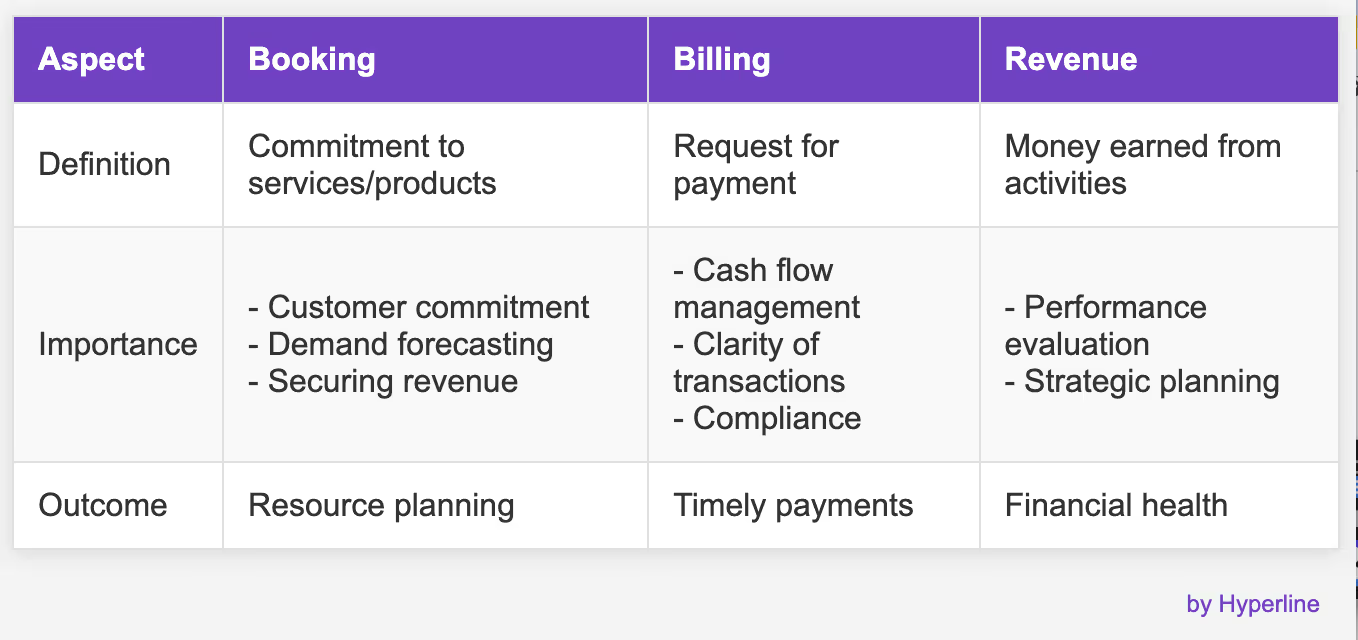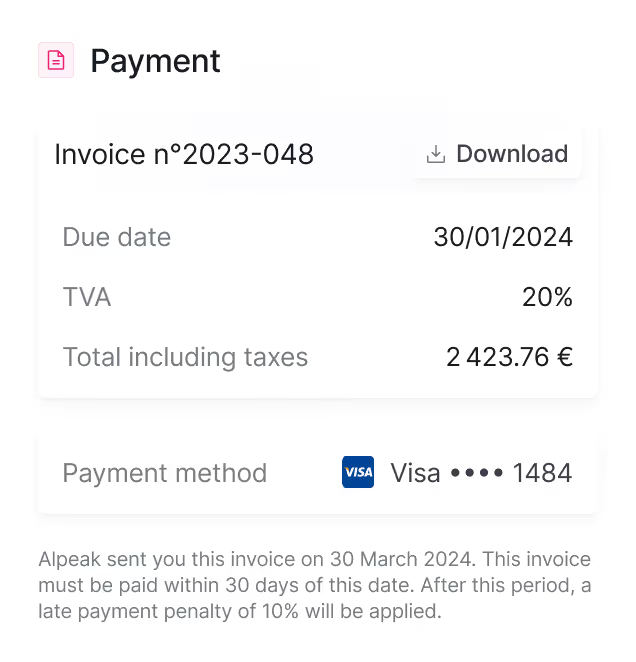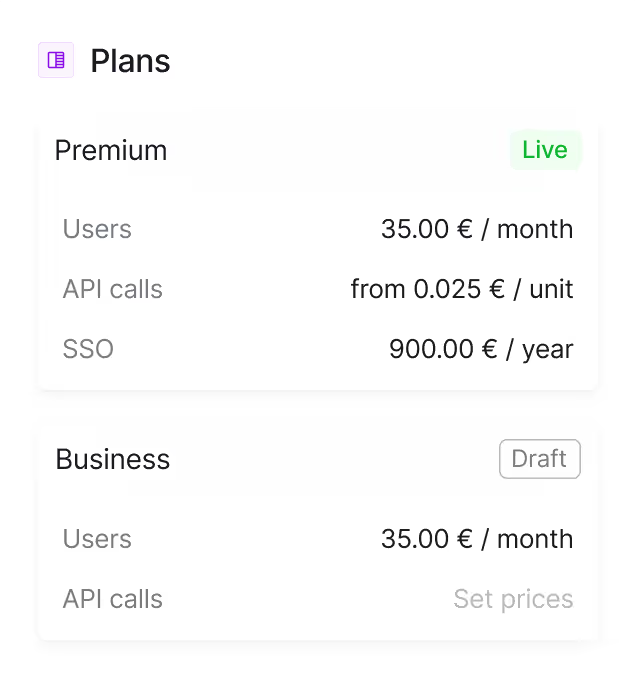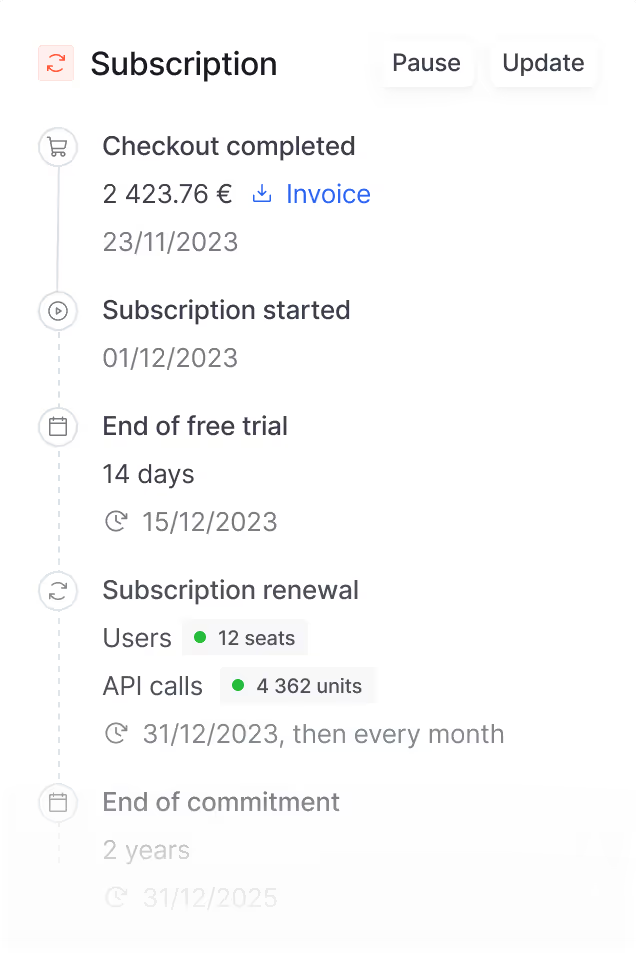Bookings vs Billing and Revenue - SaaS Billing Platform
Understanding bookings, billing, and revenue is essential for managing SaaS finances effectively. This guide highlights the serious consequences of misunderstanding booked vs. billed revenue, including cash flow issues and misaligned sales incentives.
Managing bookings, billing, and revenue is essential for ensuring profitability and sustainability. This document explains the consequences of misunderstanding booked vs. billed and how an effective billing system can enhance their management.
1. Booking
In the context of SaaS, booking refers to the commitment made by a customer to subscribe to a software service for a specific period. This can include various subscription models, such as monthly or annual plans.
Importance of booking
- Customer commitment: Booking represents a commitment from the customer, which is crucial for resource planning.
- Demand forecasting: Booking data helps businesses forecast future demand and adjust their operations accordingly.
- Securing revenue: A booking can guarantee future revenue, even if payment has not yet been made.
2. Billing
Billing is the process by which a business requests payment for the services or products provided. This includes creating and sending invoices to customers.
Importance of billing
- Cash flow management: Effective billing ensures that payments are received on time, which is critical for the financial health of the business.
- Clarity of transactions: Accurate billing helps avoid misunderstandings and maintain good relationships with customers.
- Compliance: Billing must adhere to accounting and tax regulations, which is essential to avoid legal issues.
3. Revenue
Revenue represents the money earned by a business through its commercial activities. It is recognized in financial statements when goods or services are delivered to the customer.
Importance of Revenue:
- Performance evaluation: Revenue is a key indicator of a company's performance and is used by investors to assess its financial health.
- Strategic planning: Understanding revenue streams helps businesses develop growth and expansion strategies.
What is deferred revenue?
Deferred revenue represents payments received for services that have not yet been provided. This means that the money has been collected, but the revenue will only be recognized when the services are actually rendered.
What is revenue recognition?
Revenue recognition is the process by which a company records revenue in its financial statements. This concept is fundamental in accounting as it determines when revenue is considered earned.
Principles of revenue recognition
- Accrual vs. cash basis:
- Accrual Basis: Revenue is recognized when it is earned, meaning when services are provided or goods are delivered, regardless of when payment is received.
- Cash Basis: Revenue is recognized only when payment is received. This model is less common for businesses with long-term contracts or subscriptions.
- Recognition standards:
- Companies must follow specific accounting standards, such as the International Financial Reporting Standards (IFRS) or Generally Accepted Accounting Principles (GAAP), which establish guidelines for recognizing revenue.
- Recognition conditions:
- For revenue to be recognized, there must generally be a valid contract, clearly defined performance obligations, and the company must have delivered the agreed-upon goods or services.
Easy reminder - Bookings vs Billing and Revenue

Bookings, billing, and revenue are interconnected and essential for effective business management. Having a clear understanding of each of these elements helps optimize performance and ensure the financial health of the organization.
Example of Bookings, Billing and Revenue illustrated

- Booking = $360/year, indicating that a customer has booked an annual subscription for a project management tool.
- Billing = $30/month, which means that the customer is billed $30 for each month of service. This is a part of the total annual commitment made during the booking.
- Revenue = $360/year. indicates that the total revenue recognized from the annual subscription is also $360/year, aligning with the initial booking amount.
The arrows indicate the flow from bookings to billing to revenue.
When a booking is made, it sets the stage for billing.
Billing occurs monthly (or as per the subscription terms), leading to recognized revenue.
It can seems complicated, but a good recurring billing system will automate each step of the process to make it effortless.
The consequences of misunderstanding booked vs. billed
The distinction between "booked" and "billed" revenue is critical. A failure to grasp this difference can have significant repercussions for a business.
1. Distorted cash flow projections
One of the most immediate effects of misunderstanding booked versus billed revenue is a skewed perspective on cash flow. This can lead to:
- Inadequate financial planning: You might commit to expenses or investments based on inflated revenue figures, only to find your company in a cash crunch when actual payments are delayed.
- Operational disruptions: A false sense of security regarding cash flow can result in operational inefficiencies, as management may not allocate resources appropriately, leading to potential disruptions in service delivery.
2. Ignoring potential bad debtors
Another critical consequence is the failure to account for customers who may become problematic payers.
When you do not differentiate between booked and billed revenue, you risk:
- Underestimating credit risk: By assuming that booked revenue will translate into actual cash flow, companies may overlook clients who are likely to delay payments, refuse to pay, or churn during the onboarding process.
- Increased bad debt: Without proper assessment, you may extend credit to high-risk clients, resulting in higher levels of bad debt that can erode profitability.
3. Misallocation of sales commissions
When commissions are based solely on booked revenue, without consideration of actual billing, the following issues can arise:
- Premature commission payments: Sales representatives may receive commissions for sales that have not yet generated cash flow, creating a disconnect between sales performance and actual company revenue.
- Motivation issues: If sales teams are rewarded for bookings rather than actual billings, it may encourage a focus on quantity over quality, leading to a higher incidence of sales to clients who do not pay on time or at all.
Why a good billing system is essential?
A good billing system is crucial for several reasons:
- Process automation: A good system automates billing and booking processes, reducing the risk of human error and increasing operational efficiency.
- Accurate revenue tracking: It allows for precise tracking of revenue, facilitating the correct recognition of revenue in accordance with accounting standards.
- Cash flow improvement: By automating billing, businesses can ensure that payments are made on time, thereby improving cash flow.
- Reporting and analysis: An effective billing system provides detailed reports and analyses, enabling managers to make informed decisions.
- Enhanced customer experience: Clear and accurate billing contributes to a better customer experience, which can strengthen customer loyalty and encourage renewals.
The Hyperline billing model

Hyperline’s billing model offers an automated solution for managing bookings and billing. With its advanced features, Hyperline allows businesses to:
- Automate invoice creation:
Invoices are generated automatically based on bookings, reducing the time spent on manual billing.
- Track payments in real time:
Users can monitor payments and balances in real time, ensuring complete visibility of financial status.
- Simplify revenue recognition:
Hyperline facilitates revenue recognition by integrating features that comply with accounting standards, ensuring total compliance.

- Financial transparency:
It ensures that financial statements accurately reflect the company's performance.
- Performance evaluation:
Investors and stakeholders use this information to assess the company's profitability and growth.
- Regulatory compliance:
Adhering to accounting standards avoids legal or regulatory issues.
If you already have a billing system, you can leverage Hyperline's CPQ integration to streamline your booking to billing process.

Q&A about booking vs billing
Booked vs. Billed: What is the difference?
Bill: A bill is a document that details a transaction, showing the amount owed for goods or services received.
It is typically presented to a customer after a purchase or service has been rendered. For example, when you dine at a restaurant, the waiter presents you with a bill for your meal.
Billing: Billing refers to the process of preparing and sending bills to customers, as well as the overall system of managing invoices and payments.
It encompasses all activities related to invoicing, including tracking payments, sending reminders, and managing accounts receivable.
What is the importance of revenue recognition?
Proper revenue recognition is crucial for several reasons:
- Financial Transparency: It ensures that financial statements accurately reflect the company's performance.
- Performance Evaluation: Investors and stakeholders use this information to assess the company's profitability and growth.
- Regulatory Compliance: Adhering to accounting standards avoids legal or regulatory issues.
What is an example of revenue recognition?
Consider a SaaS company that bills its customers for an annual subscription. If a customer pays in advance for a year of service, the company cannot immediately recognize the entire payment as revenue. Instead, it must spread this revenue over the subscription period. Thus, each month, one-twelfth of the total amount will be recognized as revenue, reflecting the services provided during that month.
How can a good billing system help?
A good billing system automates processes, improves revenue tracking, optimizes cash flow, and provides useful reports for decision-making.
Conclusion

Understanding bookings, billing, and revenue is essential for any business.
An effective billing system, such as the one offered by Hyperline, can greatly enhance the efficiency of these processes, ensure compliance, and ultimately contribute to the overall success of the business.
By investing in appropriate tools, businesses can better manage their booking and billing operations and focus on revenue, growth and development.
